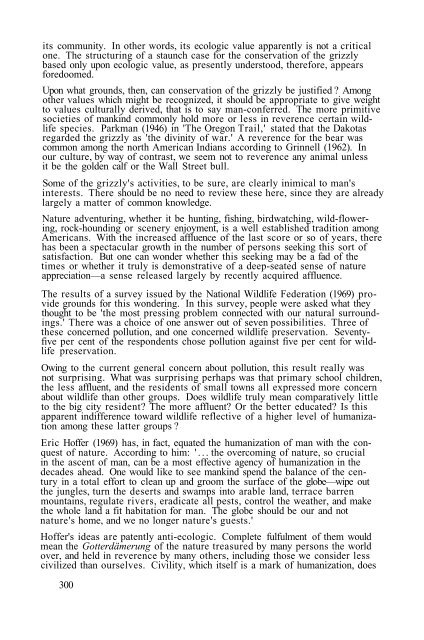Bears - IUCN
Bears - IUCN
Bears - IUCN
Create successful ePaper yourself
Turn your PDF publications into a flip-book with our unique Google optimized e-Paper software.
its community. In other words, its ecologic value apparently is not a critical<br />
one. The structuring of a staunch case for the conservation of the grizzly<br />
based only upon ecologic value, as presently understood, therefore, appears<br />
foredoomed.<br />
Upon what grounds, then, can conservation of the grizzly be justified ? Among<br />
other values which might be recognized, it should be appropriate to give weight<br />
to values culturally derived, that is to say man-conferred. The more primitive<br />
societies of mankind commonly hold more or less in reverence certain wildlife<br />
species. Parkman (1946) in 'The Oregon Trail,' stated that the Dakotas<br />
regarded the grizzly as 'the divinity of war.' A reverence for the bear was<br />
common among the north American Indians according to Grinnell (1962). In<br />
our culture, by way of contrast, we seem not to reverence any animal unless<br />
it be the golden calf or the Wall Street bull.<br />
Some of the grizzly's activities, to be sure, are clearly inimical to man's<br />
interests. There should be no need to review these here, since they are already<br />
largely a matter of common knowledge.<br />
Nature adventuring, whether it be hunting, fishing, birdwatching, wild-flowering,<br />
rock-hounding or scenery enjoyment, is a well established tradition among<br />
Americans. With the increased affluence of the last score or so of years, there<br />
has been a spectacular growth in the number of persons seeking this sort of<br />
satisfaction. But one can wonder whether this seeking may be a fad of the<br />
times or whether it truly is demonstrative of a deep-seated sense of nature<br />
appreciation—a sense released largely by recently acquired affluence.<br />
The results of a survey issued by the National Wildlife Federation (1969) provide<br />
grounds for this wondering. In this survey, people were asked what they<br />
thought to be 'the most pressing problem connected with our natural surroundings.'<br />
There was a choice of one answer out of seven possibilities. Three of<br />
these concerned pollution, and one concerned wildlife preservation. Seventyfive<br />
per cent of the respondents chose pollution against five per cent for wildlife<br />
preservation.<br />
Owing to the current general concern about pollution, this result really was<br />
not surprising. What was surprising perhaps was that primary school children,<br />
the less affluent, and the residents of small towns all expressed more concern<br />
about wildlife than other groups. Does wildlife truly mean comparatively little<br />
to the big city resident? The more affluent? Or the better educated? Is this<br />
apparent indifference toward wildlife reflective of a higher level of humanization<br />
among these latter groups ?<br />
Eric Hoffer (1969) has, in fact, equated the humanization of man with the conquest<br />
of nature. According to him: '... the overcoming of nature, so crucial<br />
in the ascent of man, can be a most effective agency of humanization in the<br />
decades ahead. One would like to see mankind spend the balance of the century<br />
in a total effort to clean up and groom the surface of the globe—wipe out<br />
the jungles, turn the deserts and swamps into arable land, terrace barren<br />
mountains, regulate rivers, eradicate all pests, control the weather, and make<br />
the whole land a fit habitation for man. The globe should be our and not<br />
nature's home, and we no longer nature's guests.'<br />
Hoffer's ideas are patently anti-ecologic. Complete fulfulment of them would<br />
mean the Gotterdämerung of the nature treasured by many persons the world<br />
over, and held in reverence by many others, including those we consider less<br />
civilized than ourselves. Civility, which itself is a mark of humanization, does<br />
300

















